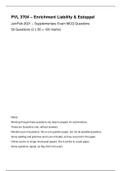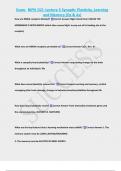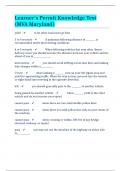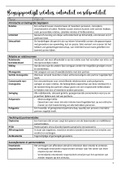PVL 3704 – Enrichment Liability & Estoppel
Jan/Feb 2021 – Supplementary Exam MCQ Questions
50 Questions (2 x 50 = 100 marks)
Notes:
Working through these questions can help to prepare for examinations.
These are Questions only, without answers.
Random pool of questions, this is one question paper, but not all possible questions.
Some spelling and grammar errors are included, as they occurred in the paper.
Online exams no longer share past papers, this is similar to a past paper.
Some questions repeat, as they did in the exam.
,PART 1
Question 1 of 50:
A has demanded payment from B of an amount of R50 000,00 which he believes B is
owing. B has checked its records and has paid the amount in the bona fide belief that the
amount is owed in terms of their contract. Unbeknown to B, his bookkeeper, C had already
paid the amount a week earlier by way of an electronic funds transfer into the account of A,
but unfortunately used the wrong invoice number with the payment. This resulted in A not
being able to allocate the initial payment to B’s account. At the time of the second payment
A's account was overdrawn in the amount of R30 000,00 and was therefore in credit in the
amount of R20 000,00 after the payment. A has taken R10 000,00 out of his account to pay
his employees their monthly wages. He has also paid R10 000,00 for a luxury weekend
after realising that his account was in credit.
Which statement best explains the date on which the possible enrichment liability of A is
calculated?
A. The date on which B informs A that A has been overpaid in the amount of
R50 000,00.
B. The date on which B’s bank account was debited.
C. The date on which C paid the money into A’s account.
D. The date on which B lodges an enrichment action (litis contestatio).
E. The date on which A used the last of the money.
Question 2 of 50
A orders goods from B and pays for the goods with a cheque. B delivers the goods, but A
alleges that they are defective and A immediately instructs his bank, C, not to pay the value
of the cheque out to B. B denies that the goods are defective. A clerk of C bank forgets to
process A’s instruction to cancel payment and pays out the value of the cheque to B.
According to case law which element for enrichment liability is absent in this set of facts?
A. None of the options are correct.
B. Enrichment.
C. Causality.
D. Sine causa.
E. Impoverishment.
, Question 3 of 50
X has stolen O’s laptop computer from his office. The laptop is worth R15 000. X has sold
the laptop to B for R3 000, who is unaware of the theft.
Which statement best describes the remedy(ies) at O’s disposal?
A. O has no claim against B, because B paid for the laptop.
B. O has a delictual claim against X for R15 000 because X stole the computer.
C. O has a claim for the laptop itself from B with the actio rei vindicatio because he has
remained owner of the laptop, and O has a delictual claim against X for R15 000
because X stole the computer.
D. O has a claim for the laptop itself from B with the actio rei vindicatio because he has
remained owner of the laptop.
E. O has an enrichment claim for R3 000 against X, because that is all that remains in
his estate.
Question 4 of 50
X has stolen O’s laptop computer from his office. The laptop is worth R15 000. X has sold
the laptop to B for R3 000, who is unaware of the theft. B has sold the computer to C for R6
000. The current whereabouts of C are unknown.
Which statement best describes the remedies at O’s disposal?
A. O has an enrichment claim for R3 000 against B based on the condictio causa data
causa non secuta.
B. O has an enrichment claim for R3 000 against B based on the condictio sine causa
specialis.
C. O has no claim against B, because B paid for the laptop.
D. O has a claim for the laptop itself from B with the actio rei vindicatio because he has
remained owner of the laptop.
E. O has an enrichment claim for R3 000 against B based on the condictio ob finitam
causam.







